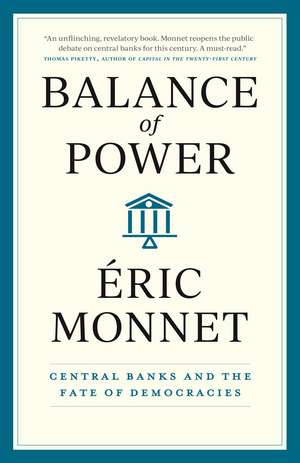Balance of Power: Central Banks and the Fate of Democracies
Autor Éric Monnet Traducere de Steven Rendallen Limba Engleză Hardback – 29 apr 2024
Two decades of financial crises have dramatically expanded central banks’ powers. In 2008, and then again in 2020, unelected banking officials found themselves suddenly responsible for the public welfare—not just because it was necessary but based on an idea that their independence from political systems would insulate them from the whims of populism. Now, as international crises continue and the scope of monetary interventions grows in response, these bankers have become increasingly powerful.
In Balance of Power, economist and historian Éric Monnet charts the rise of central banks as the nominally independent—but unavoidably political—superpowers of modern societies. This trajectory, Monnet argues, is neither inevitable nor unstoppable. By embracing the political natures of today’s central banks, we can construct systems of accountability for how they interact with states and societies. Monnet shows that this effort will do more than guard against unjust power; it will put the banks to work for greater, more democratic ends.
With existential challenges looming and the work of the Federal Reserve and European Central Bank more important than ever, Balance of Power offers a trenchant case for what this century’s central banks can—and must—become.
Preț: 135.09 lei
Nou
Puncte Express: 203
Preț estimativ în valută:
25.86€ • 28.10$ • 21.73£
25.86€ • 28.10$ • 21.73£
Carte disponibilă
Livrare economică 01-15 aprilie
Livrare express 15-21 martie pentru 45.36 lei
Preluare comenzi: 021 569.72.76
Specificații
ISBN-13: 9780226834139
ISBN-10: 0226834131
Pagini: 264
Ilustrații: 4 line drawings, 1 table
Dimensiuni: 140 x 216 x 20 mm
Greutate: 0.36 kg
Ediția:First Edition
Editura: University of Chicago Press
Colecția University of Chicago Press
ISBN-10: 0226834131
Pagini: 264
Ilustrații: 4 line drawings, 1 table
Dimensiuni: 140 x 216 x 20 mm
Greutate: 0.36 kg
Ediția:First Edition
Editura: University of Chicago Press
Colecția University of Chicago Press
Notă biografică
Éric Monnet is professor at the Paris School of Economics and director of studies at the School of Advanced Studies in the Social Sciences, Paris. He was named France’s best young economist by Le Monde in 2022. Steven Rendall is professor emeritus of romance languages at the University of Oregon. He has translated more than eighty books into English.
Cuprins
Introduction: Central Banks as Protectors
1. Central Banks, Money, and the Welfare State
2. Money from Nowhere
3. More Problems: Buying Debt, Lending Abroad, and Going Digital
4. Central Banks Everywhere
5. Democratizing the Central Banks
Afterword: The Central Bank Belongs to Democracy
Notes
Index
1. Central Banks, Money, and the Welfare State
2. Money from Nowhere
3. More Problems: Buying Debt, Lending Abroad, and Going Digital
4. Central Banks Everywhere
5. Democratizing the Central Banks
Afterword: The Central Bank Belongs to Democracy
Notes
Index
Recenzii
"The author’s principal theme is the 'insufficient democratic accountability of central banks.'"
"Monnet takes the reader through the evolution of central banks’ role in societies during the past few decades, within monetary policy as well as financial supervision. It is precisely the expansion of tasks and the scope of central banks’ policies that give urgency to the discussion of the interplay between central banks and elected bodies in democracies. One of the key premises for the author’s conclusions and proposals is that the monetary policy operations as well as the methodology of financial supervision has massive effects on the distribution of income and wealth. One can agree or disagree with this point of view, but it certainly warrants discussion."
“[An] impressive history of how central banks have become political superpowers of modern societies. . . . Monnet argues that central banks’ monetary policies should be subject to democratic control, as the banks’ current powers are too significant to be solely managed by independent authorities operating as inward-facing technocrats.”
"[Balance of Power] explores highly pertinent questions about the legitimacy of central banks that will need to be settled in the next few years."
“Essential reading for understanding why reconnecting central banks to the people is crucial to meet the major challenges of our time, from rising inequality to the climate crisis.”
"Éric Monnet’s Balance of Power is a brilliantly concise book. On the one hand, it explains what central banks do in an accessible, sufficiently technical, and historically founded manner — a useful contribution in itself, given that most undergraduate macroeconomics textbooks declare that ‘central banks set the interest rate’, gesture vaguely at fractional reserve banking, and leave it there."
"A thought-provoking and timely analysis.”
"An unflinching, revelatory book. Monnet reopens the public debate on central banks for this century. A must-read."
“Balance of Power explores the key challenge facing modern central banks: being democratic while remaining independent. Monnet captures everything that makes these institutions so interesting—and so essential to contemporary societies.”
“A forceful argument that central banks’ policies and money creation should be subject to democratic control. Populist? Maybe. But also bold and commonsensical? Absolutely.”
“Monnet shows that the political natures of central banks must be acknowledged—and then legitimated—if we are to retain their critical role for the public welfare. An essential work from one of the most important economic historians of our time.”
“Balance of Power shows that the biggest challenges of our time—climate change, rising inequality, geopolitical fragmentation—become more solvable when we reconnect central banks to the people they are meant to serve. This is a book whose time is now.”
“A lucid, compelling case for connecting central bank policies to other imperatives of public policy, from the environment to wages and beyond. A must-read for anyone interested in how democratic institutions will adapt in the twenty-first century.”
